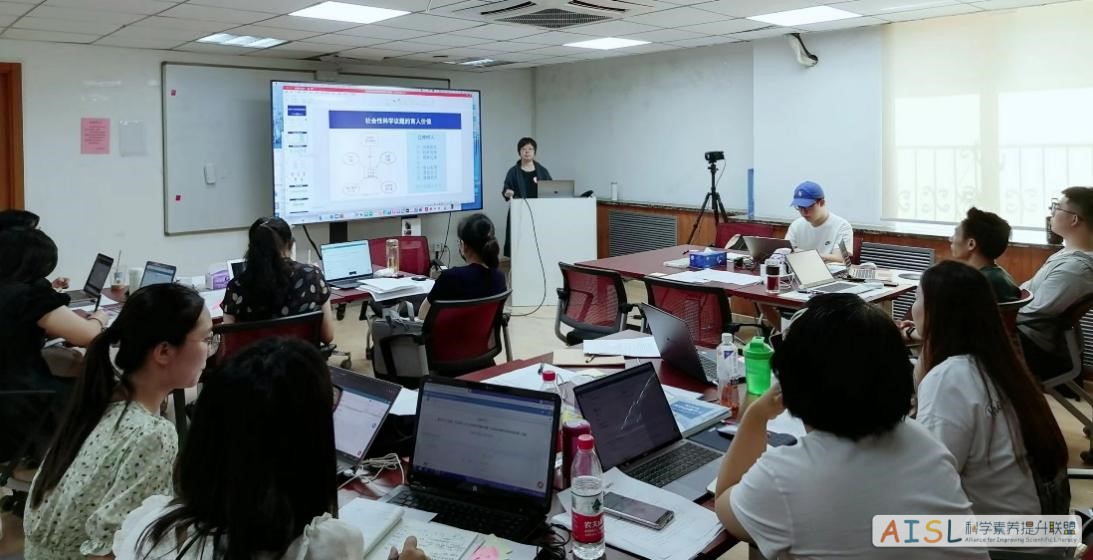北京师范大学基础教育发展管理部为促进大学研究成果与基础教育领域实践应用的双向衔接,开展了“撷英计划”基础教育改革试验项目,“社会性科学议题学习”项目组申报获批立项,将与北师大基础教育学校携手开展“社会性科学议题学习的设计与教学模式”研究。在基础教育发展管理部的主持下,项目组与合作学校于2023年5月18日举行在线通气会,共同商议校本实施计划,双方开展筹备工作。2023年7月14日至15日项目组在北京师范大学举办暑期工作坊,首批合作的北京师范大学附属实验中学、北京师范大学实验小学、北京师范大学亚太实验学校的教师及项目办研究团队一起参加了本次工作坊。

本次工作坊持续六个半天。首场的破冰活动很快将大家凝聚在一起,在团队成员自我介绍以及为他人描绘肖像画之后,由项目负责人林静介绍项目概况,以问题池、小组轮流说的方式,组织团队成员深入了解社会性科学议题,切身感受议题的特征,认识本项目的立意所在。在接下来的工作坊活动中,团队成员围绕“全球变暖”的课程方案分小组深入研讨、展开交流,感知技术赋能下的跨学科学习课堂,共同探索引发学生核心素养发展的课堂教学路径。工作坊活动期间,合作项目团队成员进行了坦诚深入的交流与碰撞,充分展现出各位老师对于教育的热爱与追求。

在本次工作坊的最后,团队成员共同商定校本计划和项目方案,为下学期各校课程方案的有效实施奠定了基础。
To promote the two-way connection between university research output and practical applications in the field of basic education, the Basic Education Development and Management Department of Beijing Normal University launched the Xieying Program as a basic education reform pilot project. The program was proposed by the Socio-Scientific Issues Learning project team, and then approved to set up. It works with Beijing Normal University Basic Education School to carry out research on the “Design and Teaching Model for Socio-Scientific Issues Learning”. Under the auspices of the Basic Education Development and Management Department, the project team and partner schools held an online briefing meeting on May 18, 2023, to jointly discuss the school-based implementation plan. Both parties then started preparatory work. The project team held a summer workshop at Beijing Normal University from July 14 to 15, 2023. The first batch of teachers and project research teams from Beijing Normal University Affiliated Experimental Middle School, Beijing Normal University Experimental Primary School, and Beijing Normal University Asia-Pacific Experimental School participated in this workshop.
This workshop lasted for six half days. The first ice-breaking activity quickly brought everyone together. After the team members introduced themselves and drew portraits for others, the project leader Lin Jing introduced the project overview. Through question pools and group discussions in turns, she led team members to have an in-depth understanding of socio-scientific issues, feel the characteristics of the issues by themselves, and learn about the project purposes. In the activities after that, team members had group discussions and exchanged ideas around the “Global Warming” course plan. They experienced the interdisciplinary learning class empowered by technology, and jointly explored classroom teaching paths that contribute to students’ core competency development. In these workshop activities, members of the cooperative project team had open and thorough exchanges and collisions of ideas, fully demonstrating their passion and pursuit of education.
At the end of this workshop, team members jointly agreed on school-based plans and project plans, laying a solid foundation for the effective implementation of each school’s curriculum plan in the new semester.
